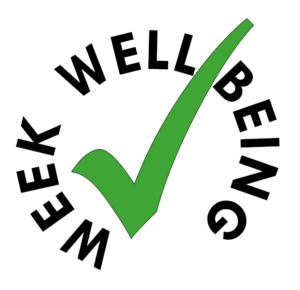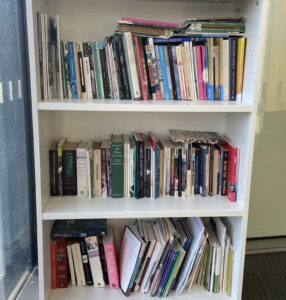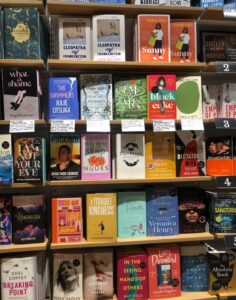Bibliotherapy is being used to help students to better their mental health and wellbeing.
Liverpool John Moores University’s Counselling Service has partnered with the university’s libraries and the mental health team to equip students with self-help mental health books.
The universities bibliotherapy initiative, Book My Mind, allows students to access a wide range of self-help books and discuss their feelings in group sessions.
The group sessions are led by counsellor, Debbie Burns, who spoke to MNL about bibliography at LJMU as part of our Wellbeing Week.
What is bibliotherapy?
Bibliotherapy is a creative therapy that involves storytelling and the reading of specific texts with the purpose of healing.
Evidence has shown bibliotherapy can be an effective way of helping people with a range of emotional difficulties.
Reports suggest that bibliotherapy has been used for many decades.
In the early nineteenth century, doctors prescribed books for guidance and relief from suffering.

Moreover, soldiers in World War One reportedly read to manage post-war trauma.
In the UK, bibliotherapy began in Cardiff.
A scheme was developed linking the city’s libraries and medical practices.
The scheme is known as ‘Book Prescription Wales’ and is used across the health service.
Bibliotherapy at LJMU
Debbie Burns, a counsellor and one of the creators of the initiative, spoke to MNL about the Book My Mind initiative.
Debbie said: “We launched it this time last year, but obviously it was in lockdown, so it only got fully launched this academic year. Prior to that, in the counselling rooms I very often recommend books to students.”
She added: “It struck me that we’ve got this university library with all the academic textbooks you like and the library has just launched a leisure collection as well. I thought, wouldn’t it be good if we could have a self-help section?”
Book topics
Debbie and the other counsellors decided to put together a list of self-help books, which cover different topics.
These include, addiction, bereavement, eating disorders and self-harm, and many more.
All the books relate to issues students are struggling with, as a result they are hoped to be of great use to both students and staff at the university.
You can find the full list of books and their related subjects here: book-list.pdf (ljmu.ac.uk)
Debbie shared her view on the books on offer.
“We didn’t want a pile of dusty, dated books, we wanted them to be relevant, written by people who have been through struggles with their wellbeing.”
At the moment, there are over a hundred books available, and they are divided between the two university libraries, Aldham Robarts and Avril Robarts.
“WE LOSE OURSELVES IN BOOKS, WE FIND OURSELVES THERE TOO.”
Debbie shared how she felt bibliotherapy books should be available for everyone, in the same way that other books are at the libraries.
As a result, more people will be able to benefit from the scheme.
She said the team aims to: “Put the books out there like little pocket therapists for people who need something”.
She added: “Sometimes a book is comforting, sometimes they give advice, they are a way of relating to someone who’s been through that experience.”

Bibliotherapy Groups
Debbie Burns holds the bibliography groups eight times a year, that focus on a particular book or topic each month.
Debbie spoke about the importance of the groups.
“The groups are a way of coming together and talking about subjects we wouldn’t normally. It puts wellbeing into our everyday language.”
Future events
Last month, the group discussed the book Reasons to Stay Alive by Matt Haig.
The book is based on Matt Haig’s experiences of living with depression and an anxiety disorder which he developed in his 20’s.
Next month, the group will focus on writing for personal wellbeing and development.
Dr Anne-Marie Smith, from the School of Education, will be giving a group creative writing workshop.
As a result, it is hoped that students can use writing as an emotional output.

Advice for Students
Debbie shared her advice for any students struggling with their mental health.
She said: “Reach out and talk to someone, we’ve got the wellbeing team, they sit between all the other teams, they can very often point the students in the right direction.
“Talk to a friend, talk to family, reach out to us, reach out to the wellbeing team, contact your doctor, any of those things.”
“Essentially, don’t keep it to yourself, there’s so many people struggling with their well-being too. It’s really important not to keep it to yourself.”
Bibliotherapy Blog
Staff and students can contribute to a bibliotherapy blog set up by the team. The blog contains reviews of self-help books that are on the list.
These include reviews of the books ‘My Sh*t Therapist: And Other Mental Health Stories by Michelle Thomas.’ and ‘The Unexpected Joy of Being Sober by Catherine Gray.’
In the future, Debbie hopes that the blog can grow into a space where students and staff can share their experiences using self-help books.
To contribute to the blog, the group asks that you contact Debbie Burns via her email, [email protected]
Get involved
Students are welcome to attend any of the events held by Debbie and her team.
Although the groups will discuss the book covered that month, students are still welcome to attend even if they have not read the book.
Additionally, Debbie welcomes suggestions for events or books that students or staff would like to see in the self-help range.
You can find a list of the groups being held here: book-my-mind-groups-leaflet-2122.pdf (ljmu.ac.uk)
Additionally, you can book onto upcoming Book My Mind events here: SAW Events (ljmu.ac.uk)
You can find out more about the project via the Student Advice and Wellbeing social media channels, @ljmusaw
Featured image by Mark Jones.









